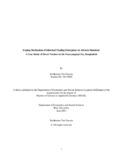| dc.contributor.advisor | Amin, ATM Nurul | |
| dc.contributor.author | Nayam, Kushnuma Tun | |
| dc.date.accessioned | 2021-10-11T06:27:47Z | |
| dc.date.available | 2021-10-11T06:27:47Z | |
| dc.date.copyright | 2021 | |
| dc.date.issued | 2021-06 | |
| dc.identifier.other | ID 18275005 | |
| dc.identifier.uri | http://hdl.handle.net/10361/15207 | |
| dc.description | This thesis is submitted in partial fulfillment of the requirements for the degree of Master of Science in Applied Economics, 2021. | en_US |
| dc.description | Cataloged from PDF version of thesis. | |
| dc.description | Includes bibliographical references (pages 52-55). | |
| dc.description.abstract | Street vendors operate their economic activity despite routine extortions and harassment. Eviction policy however dislodges these petty traders throwing them in uncertainty of earning an income for living. This was evident in recent actions of Narayanganj City Corporation (NCC) from clearing the pavements. Meanwhile from mid-March 2020, lockdown arising from COVID -19 has been affecting street trading. In this backdrop, this study explored coping mechanisms street traders adopt in these three major adverse situations. Other than field observations, a questionnaire survey was conducted in five selected locations of the city. Other than these worksites, for the household level information, the survey was also conducted at their dwelling units for household level information. Collected information includes worksite conditions, socioeconomic conditions including migration background, dwelling units’ conditions, and how they cope with eviction, extortion, and the pandemic.
Income, employment, asset, and health are the four indicators that were used for comparing the effects. On income, the data showed that most of the street vendors face income loss from frequent eviction and routine extortion. On employment, findings show that most street traders changed their jobs for a short time. They wait for an opportunity to come back or move to another location. Only 12 percent left street vending as a consequence of eviction. Extortion does not lead to change in employment. This practice allows work continuity by enduring harassment and or bribing. Almost 80 percent changed jobs during the first phase of COVID -19. On assets, the findings showed that street vendors suffered asset loss in the form of using up savings. About 42 percent used their savings for coping with the consequence of eviction. The corresponding proportions are 14 percent for extortion and 24 percent for the pandemic. On health, about 60 percent suffer from anxiety due to eviction, extortion, and the ongoing pandemic. Injury from assaults is common. Most street vendors reported that there are sanitation facilities nearby, but they are not allowed to use it. Dengue is cited as the most common ailment. Other health related problems include hearing problems, headache and skin disease.
Evidence on coping mechanisms or response to the difficulty encountered suggests a kind of stickiness with street trading. This is evident in the survey data of 80 percent respondents reporting that they return to the same activity. About 11 percent reported that they moved to another economic activity - still in the city. Only 4 percent returned to their villages, and another 5 percent engaged in alternative occupations in their respective villages.
Policy implications of this research include specifying hawking points for street trading; eviction decisions ought to be accompanied with rehabilitation programs; and clear earmarking of certain locations for vending and non-vending. Supportive policies at city level include planning authority to have provisions of physical or spatial accommodations for street vendors. | en_US |
| dc.description.statementofresponsibility | Kushnuma Tun Nayam | |
| dc.format.extent | 78 pages | |
| dc.language.iso | en | en_US |
| dc.publisher | Brac University | en_US |
| dc.rights | Brac University theses are protected by copyright. This may be viewed from this source for any purpose, but reproduction or distribution in any format is prohibited without written permission. | |
| dc.subject | Eviction | en_US |
| dc.subject | Harassment | en_US |
| dc.subject | Extortion | en_US |
| dc.subject | Covid-19 | en_US |
| dc.subject | Coping mechanisms | en_US |
| dc.subject | Informal sector | en_US |
| dc.subject | Work sites | en_US |
| dc.subject | Dwelling units | en_US |
| dc.subject.lcsh | Street vendors | |
| dc.subject.lcsh | Vending stands | |
| dc.title | Coping mechanism of informal trading enterprises in adverse situation: a case study of street vendors in the Narayanganj City, Bangladesh | en_US |
| dc.type | Thesis | en_US |
| dc.contributor.department | Department of Economics and Social Sciences, Brac University | |
| dc.description.degree | M. in Economics | |

